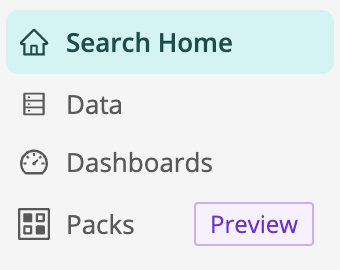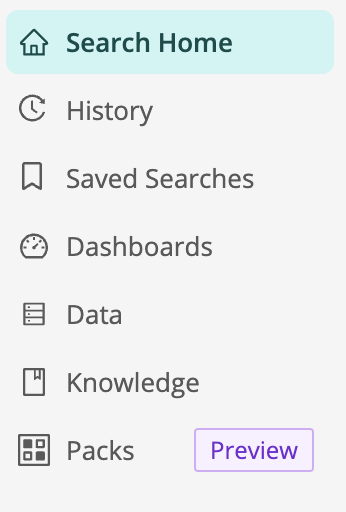Cribl Search 4.10.0
| PRODUCT | DATE | RELEASE | ADDITIONAL RESOURCES |
|---|---|---|---|
| Search | 2025-01-29 | Feature | Known Issues |
Cribl Search 4.10 applies improved type coercion, adds numerous new functions for manipulating objects and numbers, enables you to share searches and search state via URL, and more.
Important Changes
These changes to Cribl Search might require you to check or modify existing queries, or other configuration, especially on saved searches.
Deprecation Notice: Dataset Acceleration
Cribl is deprecating Dataset Acceleration (a Preview feature) in preparation for a different solution. This feature will be removed in a future release. Please continue to report issues through normal Cribl support channels, but assistance for this deprecated feature might be limited.
Deprecation Notice: Pack Export Modes
Cribl has deprecated the Merge safe and Default only options previously selectable when exporting a Cribl Search Pack. (Selecting these options triggered conflict errors upon some valid exports.) All Search Pack exports now automatically use the option previously labeled Merge. This change does not affect Stream/Edge Packs.
Deprecation Notice: AI Field Summaries Prompt
Cribl Search no longer prompts you to Generate Field Summaries when you use Cribl Copilot to generate a KQL query from natural language. (Cribl Search now automatically maintains field summaries in the background, and updates them as your Datasets evolve.)
Concatenate Strings with strcat Instead of +
To concatenate strings, Cribl Search now enforces using the strcat function, to build expressions of the
form: strcat("string1", "string2"). Check and update any existing expressions in which other functions or operators
relied on undocumented "string1" + "string2" notation, because these concatenations will now return null.
Improved Type Coercion
Cribl Search now applies stricter type matching to filter terms. This will make filtering more predictable, but it might change the results returned by existing queries that were built around looser type evaluation. In existing searches - especially scheduled searches - check all comparison expressions, and verify that sampled searches still return expected results.
The most important changes to type matching rules are:
- More Precise Definition of
bool - More Consistent Treatment of
null - More Consistent Number Matching (including numeric strings)
- More Consistent Behavior of Type Conversion Functions
- New Type and Function Aliases
More Precise Definition of bool
Cribl Search now uses a stricter, more straightforward definition of the bool type, ensuring more predictable
behavior when working with bool values. For the latest documentation and examples, see bool.
In a related fix, bool comparisons now work correctly with the implicit cribl operator, so you can
create expressions of this form:
dataset="cribl_logs" job._definition.disableNotifications = true | limit 100Previously, in comparisons, the cribl operator treated bool values as string values. So
Cribl Search would have implicitly evaluated the above expression as:
dataset="cribl_logs" job._definition.disableNotifications = "true" | limit 100More Consistent Treatment of null
In certain edge cases, Cribl Search now treats the null value more consistently. For the latest documentation
and more examples, see null.
| Example | Result Before | Result Now |
|---|---|---|
10 - null | 10 | null |
10 * null | 0 | null |
5 > null | true | null |
tostring(null) | "null" | null |
toint(null) | 0 | null |
tobool(null) | false | null |
not(null) | true | null |
More Consistent Number Matching
In certain cases, number matching (including numeric strings) works differently now, making the overall experience more consistent.
| Example | Result Before | Result Now |
|---|---|---|
"1" == "1.0" | false | true |
"30" < "100" | false | true |
More Consistent Behavior of Type Conversion Functions
In certain edge cases, type conversion functions (tobool, todouble, toint,
tolong, toreal, and tostring) now work more consistently.
| Example | Result Before | Result Now |
|---|---|---|
toint(null) | 0 | null |
toint("") | 0 | null |
New Type and Function Aliases
Some of the changes mentioned above have turned a few types and functions into aliases. Many were already functioning as aliases but weren’t documented as such, while others had their behavior slightly adjusted in specific edge cases.
Here’s the list of functions affected:
| Function | Aliases |
|---|---|
tobool | bool |
todouble | decimaldoublerealtoreal |
toint | intlongtolong |
And for the up-to-date list of type aliases, see Types.
New Features
This release includes the following new features.
New Dynamic (Bag) Functions
The new dynamic scalar functions (also known as “bag functions”) allow you to manipulate objects by
operating on dynamic values, including dynamic arrays and property bags:
bag_has_keybag_keysbag_mergebag_packbag_pack_columnsbag_remove_keysbag_set_keybag_zipmake_bagmake_bag_ifzip
New Operator: mv-pull
The new mv-pull operator pulls key-value pairs from array objects into a top-level event, or into a
dedicated object/bag.
New Function: ceiling
The new ceiling function rounds up a numeric expression’s value to the nearest matching integer. You can
use ceil as an alias for this function.
Packs Expansion (Preview)
In Cribl Search Packs (a Preview feature), you can now share saved searches, Datatypes, and Knowledge objects (Macros and Lookups), in addition to the Dashboards supported in previous releases. We’ve also added new UI options to move Dashboards and Datatypes between Packs, and between Packs and your Search Organization’s global context.
Share Searches and State Details via URL
When Cribl Search executes a query, the resulting URL now captures the query string, time-range selection, sample-ratio selection, and any chart and table settings that were applied in aggregated results. You can copy and share this URL. With appropriate Permissions, pasting the URL will replicate the search with all these state details.
Manage Saved Searches as JSON
You can now edit your saved searches in a JSON editor built into Cribl Search, and import and export JSON files that encapsulate complete configurations.
Generate Visualizations from Datasets
On the Search Home page, hovering over a Dataset now displays a Visualize button. Select this button to prompt Cribl Copilot to directly suggest visualizations that might be useful in displaying this data. You can then select, modify, or replace these suggestions, and add your chosen visualization to a Dashboard.
UI/UX Improvements
This release includes the following improvements to the Cribl Search UI/UX.
Expanded Sidebar
We added a few items to the Cribl Search sidebar:
- History (previously in Search Home > History)
- Saved Searches (previously in Search Home > Saved)
- Knowledge (where you’ll now find Lookups, Parsers, Regexes, Grok patterns, and Macros).
Also, Data now includes Datatypes (previously in Settings > Search > Datatypes).
| Before | After |
|---|---|
 |  |
Wrap Cells in the Event Viewer
The Events tab now allows you to wrap cells, to prevent values from overflowing.
Customize Your Results Tables
When viewing events in a table, you can now select which fields you want to include, making the results much easier to scan.
Also, tables displaying below Dashboard visualizations now support column sorting.
Single-Value Chart Formatting
Single-value charts now display their single value with a comma (,) as the thousands separator. This
is optional but enabled by default.
New Login Failure Message
To reflect authentication scenarios beyond username/password authentication, the displayed login failure message in the UI now reads “Authentication unsuccessful. Please try again.”
Corrections
This release includes numerous fixes to various areas of Cribl Search, most notably:
| Reference | Description |
|---|---|
SEARCH-8150 Known issue | Single-value interactions now respect the time-range picker instead of defaulting to the last hour. |
| SEARCH-7773 Known issue | Pack-imported Dashboards can now be shared from the global Dashboards page without triggering an error. |
| SEARCH-8283 SEARCH-8282 | The coalesce function now correctly returns false or 0 (respectively) when evaluating expressions like coalesce(false, true) or coalesce(0, 1). Previously, coalesce skipped expressions with false or 0 first argument. This correction might affect saved searches that relied on the incorrect skip behavior. |
| SEARCH-7966 | We’ve clarified the behavior of comparison and string operators when used with (respectively) the cribl and where operators. At the sections linked here, you’ll find updated details about case-sensitivity, and about wildcard and regex support, along with added examples. |
| SEARCH-7785 | Charts using the project operator now display the X axis correctly. |
| SEARCH-6973 | Double semicolons ;; are now working as expected. |
| SEARCH-8543 | When you select Search the Results to query the results of a previous search, the time range is now set to All time by default. |
| SEARCH-8186 | The match_regex operator no longer throws an error when the second argument is an empty string. For example, this works correctly now: match_regex('hello', ''). |
| SEARCH-8121 | The unixtime_milliseconds_todatetime function works correctly now, no longer replicating unixtime_seconds_todatetime. |
| SEARCH-8036 | The time range setting now requires the earliest value to always be earlier than latest. |
| SEARCH-7212 | History now correctly displays queries that begin with a comment line. |
| SEARCH-8531 | The indexof function now returns null for invalid arguments, preventing infinite loops. |
| SEARCH-3571 | Members with the “User” Search Member Permissions can no longer see the New Dataset Provider wizard, whose use is restricted to Admins and Editors. |





